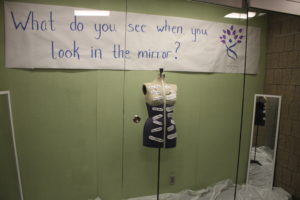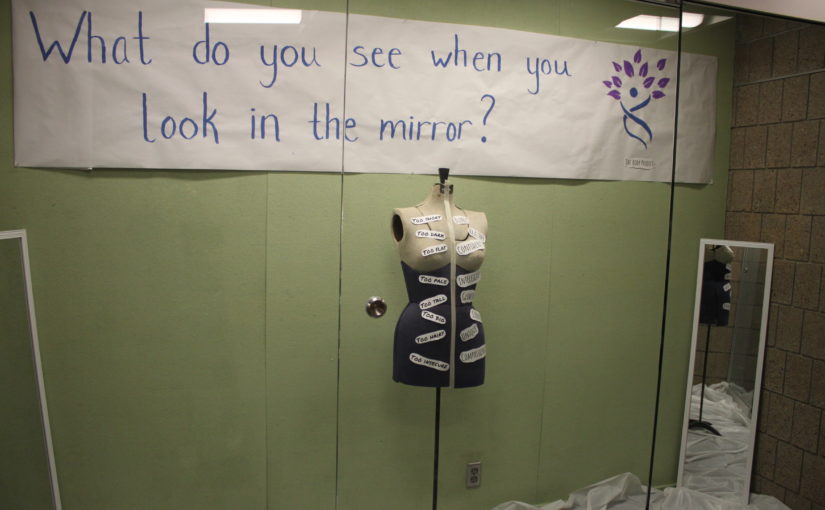The “perfect” woman, something most women today struggle to fight against. Media has taught people to compare themselves to this ideal body image. The Body Project strives to help with body positivity and bring out those inner negative thoughts against your body.
The Body Project is a nationwide program that is supported through research and feedback from people who have attended a workshop. To the NDSU campus, the Body Project is a newly peer-led group that was created fall 2016. They try to host workshops monthly and for this month one was Oct. 11, and the second session will be a continuation on Oct. 18.

Peer leaders for the Body Project (L to R) Ali Buth, Annika Arnold, Shelby Thorvilson.
With the Body Project there are peer leaders who run the program and workshops: Ali Buth, graduating in December 2017, from Barnesville, Minnesota; Annika Arnold, a sophomore, from Minot, North Dakota and Shelby Thorvilson, graduating spring 2018 from Fargo, North Dakota. These three peer leaders were able to sit down to discuss the goals and experiences within the peer-led group on campus.
The nationwide program began with research for years until they developed the program, leading to each campus continuing their research through their workshops. To become a peer leader Buth, Arnold and Thorvilson, had to go through a 15-hour training without any prior knowledge to what this was for or what they would be doing.
Buth was able to explain the process and why people have to attend at least two sessions when they get involved.
“When they (students) sign up they have to commit that they’ll come to two, so there’s two sessions and one workshop, each two hours long, and for the research they want them to be as close to a week as possible,” Buth explained. “Session one is just the beginning part.”
“And there’s time in between because there’s take home activities that they need time to complete, and we come back in the second session and talk about those activities and we continue the discussion,” Arnold explained.
While the Body Project and their peer leaders are unable to disclose any information as to exactly what happens during a workshop, for privacy reasons, Thorvilson explained a little more as to what the type of workshop they had finished on Oct. 11 was mostly about. “We focused a lot on what they call the appearance ideal or the perfect woman, and how the media and just in general we’ve been shaped to kind of conform to this idea of what is the perfect woman,” Thorvilson shared.
“Kind of combat that not all of us can conform to this ideal and it’s honestly very unrealistic to be this ideal,” Thorvilson concluded.
In workshops they tend to focus on different topics, but mostly “talk about the appearance ideal and going against fat talk and positivity,” Buth shared.
The importance of talking about how media shapes body image to be a certain way is growing, which is why the Body Project believes it is important to acknowledge these thoughts. The three peer leaders explained why they think recognizing negative body image is important:
“I feel like it’s something that is always in the back of your mind,” Arnold explained. “Like no matter who you are, there’s something that you’re not happy with about yourself, so I feel like everyone is struggling, but no one wants to talk about it. So just being somewhere for like two hours with other people, where you have something common to discuss and you’re both passionate about what you’re talking about, is important.”
“Especially in colleges, like young women have so much going on in their lives, and everywhere they look, even if you don’t realize it right away, there’s something that is telling you how you should dress and how you should look,” Buth continued. “Especially with social media now, there’s such a pressure to be like the perfect girl like you see on Instagram, and I think it’s just nice for people to get together and talk about and realize that there are other people that have the same thoughts as you; it kind of lifts your spirits a little bit.”
“We all go through it and, whether we chose to talk about it or not, it’s nice when we do have girls sign up,” Thorvilson said. “It’s just nice to have that commonality and be able to combat what we experience with negative body image on a day to day basis and just come together for two hours and really focus on the positives that our bodies have to offer.”
People tend to be wary of the subject and overall signing up for these workshops because they feel as though they will be judged, but that is not the case. The peer leaders know this is a difficult subject for mostly everyone. “It is a personal subject and you don’t really share that stuff with people on a daily basis, but everyone opens up really well during the session,” Buth explained. They also notice how much the workshops tend to help people, within a two-hour period. “It’s just nice to see people leave the workshop happy and a little more confident,” Buth said.

The Body Project display in The Union makes you think about how you see yourself.
Students at NDSU may still be skeptical of the workshops, but the peer leaders shared how they have had people come up afterward and explain how it helped them and left a positive impact on their life.
“When I started this last year I just kind of showed up,” Buth shared. “I didn’t ever really have a super negative image about my own body, but even that it just helped me come so far; I was really surprised.”
“Going into college, I had a very severe eating disorder to the point I was in treatment in Fargo and should have been hospitalized — I think a major part of that was contributed to what I saw on social media, what I thought was perfect and so now I do try to promote that everyone should be comfortable in their body, how they are, it’s not something that I was always comfortable talking about, but now that I have reached out about it — I’ve had other people come to me with the same issues seeking help and this is just why I continue to do it,” Thorvilson shared. “So that’s why I signed up; it’s just another way for me to help others and try to help them not get to the point that I did.”
“I was always so hard on myself and I viewed myself so negatively, and it’s just not good for your mental health to feel that way, and — I feel so much happier now, just overall satisfied with life now,” Arnold shared.
The Body Project wants to help people connect while sharing their struggles. Many times peer leaders have seen people stay after, have the same majors, same hometowns and overall seen people connect in this strange way. Personal struggles are able to bring people together since they are such difficult topics to talk to a stranger with or even a person you know well. Although it seems scary, they took a leap and they think should you too. “If people just take the leap and do something to get involved then that’s the hardest step,” Buth said.
Students can find more information about the Body Project on Facebook and on the NDSU website under Student Health Services.
